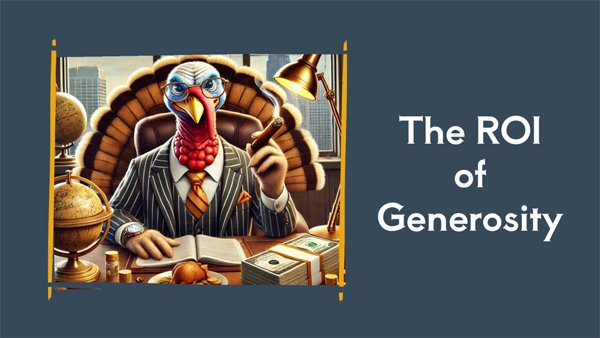My master’s thesis can be summed up in one sentence: there is an ROI to being generous.
I believe we should exploit this principle, ethically…
In the 1990s, hair metal bands were regularly regarded as some of the rudest, most ill-mannered, and unlikable artists in history. (Sure, you can demonize other forms of music if you’d like, but bands like Motley Crue, Guns N’ Roses, and Poison, top the list…)
Willie Nelson, on the other hand, had already played music for decades and would stay after concerts for hours to shake hands with anyone who was willing to wait.
This study was where I found a niche in business that suited my personality because I love business, but I also love ethics. It was nice to study and learn that there was an ROI to simply not being a dick.
It feels apropos to write about “generosity” the day before Thanksgiving here in the United States, but of course, a lot of that will get thrown out the window on Black Friday… (it sure is funny that the “day of thankfulness” in this country is followed by the “day of racing to get the things we don’t have and want…” 🤷 but alas, humans are weird…)
Have you ever thought about how generosity and trust drive the modern economy?
Despite the stereotypes of cutthroat competition, business thrives when people are generous—not in giving things away for free, but in creating “value” for each other.
Trade and collaboration didn’t emerge simply because of markets or business—they’ve been part of human history forever. Even among strangers, early humans bartered and found ways to cooperate. It’s in our DNA to connect and create a mutual benefit.
Adam Smith touched on this in his paradox of human behavior (known as “Das Adam Smith Problem”): we are both selfish and altruistic by our nature.
Generosity allows us to bridge this gap.
A few reasons why this matters:
• Trust Builds Prosperity: Studies show that societies with high trust levels are more prosperous. Successful businesses are built on this foundation.
• Generosity Scales Impact: Think about how businesses innovate to solve problems—this is generosity in action, creating solutions that improve lives.
• Commerce Encourages Inclusion: Markets, when fair, allow individuals from diverse backgrounds to participate and succeed.
Interestingly, as commerce grows, so does kindness.
Charitable giving has outpaced economic growth in recent decades. (Read that again if you need to.)
The very entrepreneurs who build thriving businesses are often the ones funding causes that improve society.
Generosity isn’t just a moral choice; it’s also a strategic one. When businesses and individuals give their best—whether it’s ideas, service, or time—they create ecosystems where trust and value exchanges thrive.
Here’s something you probably don’t do much… (HA!)
The next time you walk out of a shop or close a business deal, I double-dog dare you to ask yourself: Did this exchange leave both sides better off? Did I pay enough for this shop owner to actually benefit his life/family?
To me, that’s where the best form of capitalism ought to reside.
There’s an ROI in being Generous.
I believe we should exploit it. (Ethically!)
#Leadership #Trust #Generosity #BusinessInnovation

